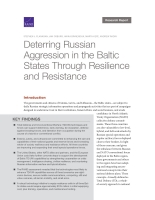by Stephen J. Flanagan
Research Questions
 Which unconventional methods are the Baltic states considering to deter and defend against potential Russian attacks? Which are they already using? What are some of the differences between the existing strategies of the three Baltic states? What are promising options for total and comprehensive defense and unconventional warfare in the Baltics? What are some of the possible scenarios for Russian aggression and NATO response? Which technologies would be most useful for resistance organizations? How can the United States, other NATO allies and partners, and the European Union assist in developing and funding these unconventional efforts?
Which unconventional methods are the Baltic states considering to deter and defend against potential Russian attacks? Which are they already using? What are some of the differences between the existing strategies of the three Baltic states? What are promising options for total and comprehensive defense and unconventional warfare in the Baltics? What are some of the possible scenarios for Russian aggression and NATO response? Which technologies would be most useful for resistance organizations? How can the United States, other NATO allies and partners, and the European Union assist in developing and funding these unconventional efforts?
The authors of this report assess how unconventional defense plans and capabilities — to include total and comprehensive defense, societal resilience, and resistance strategies — being pursued by the governments of Estonia, Latvia, and Lithuania (referred to as the Baltic states) can deter and counteract Russian hybrid aggression and military attacks in the Baltic region. They advance a framework for evaluating the utility of unconventional and total defense efforts at various phases of conflict for strengthening deterrence and defense. They identify military and civilian technologies that could enhance the effectiveness of these efforts, the cost of procuring those technologies, and possible tradeoffs with the development of conventional defense capabilities.
The authors estimate that a robust technology initiative to enhance these capabilities for all three states would cost about $125 million, could be implemented over several years, and is scalable. The authors also discuss the benefits and risks of expanding unconventional and total defense efforts and potential Russian responses and countermeasures. Finally, they outline steps that the Baltic governments, the United States, other NATO allies and partners, and the European Union could take to enhance these efforts.
The authors conclude that total defense and unconventional warfare capabilities can complement the existing conventional defense efforts of the Baltic states and NATO, improve warning of an attack, augment initial defenses, and buy time for (and provide support to) national and NATO conventional responses.
Key Findings
Total Defense (TD) and Unconventional Warfare (UW) capabilities have the potential to deter, delay and disrupt Russian military aggression
The Estonian government has longstanding and highly developed territorial defense, resilience, and resistance plans and capabilities.
The Latvian government has given priority to developing a professional army over the past decade, but is now committed to enhancing the size and capabilities of its and national guard and reserve forces and improving whole-of society resilience efforts.
The Lithuanian government has prioritized its conventional forces, but is taking steps to bolster the training and capabilities of national guard and volunteer forces and has launched a major effort to educate its citizens on resilience and resistance in case of hybrid threats or invasion.
All three countries are improving and expanding their small special operations forces.
TD/UW techniques and forces can support deterrence, early warning, de-escalation, defense against invading forces, and liberation from occupation during the course of a hybrid or conventional conflict.
The United States, other NATO allies and partners, and the European Union could take further concrete steps to support the Baltic countries in developing their TD/UW capabilities.
The RAND assessment revealed that the technologies most likely to enhance the capabilities across all scenarios are night-vision devices, robust secure mobile communications, mobile computing, still and video cameras, all-terrain mobility, and small arms.
A robust technology initiative to equip resistance cells in all three Baltic states would require approximately $125 million in initial equipping cost, plus training, operations, and maintenance funding.
Recommendations
Expand support for planning and training for crisis management, civil defense, and countering hybrid and "grey zone" attacks.
Coordinate increased strategic communications efforts to counter Russian information warfare activities.
Support the creation or expansion of national and regional intelligence fusion centers to integrate civil, police, and military analysis capabilities to improve warning of impending attacks, and deepen the Baltic states' connectivity to intelligence fusion centers in neighboring countries and at NATO and the European Union (EU).
Provide enhanced sensors and associated training to Baltics border guard forces to help them better deal with hybrid threats.
Expand UW training of Baltics SOF and National Guard units and expand their inventory of portable anti-armor, anti-aircraft, and mining systems.
Provide critical support capabilities such as radios, small UAVs, and night vision devices.
Help with establishing decentralized stockpiles and caches of relevant non-military supplies to sustain resistance cells in case of war including clothing, shelter materials, medical supplies, food, water purification tools, cash, power sources, and vehicles.
No comments:
Post a Comment